In the fourth season of Murder, She Wrote is the episode The Way To Dusty Death. It is one of the greatest of the Big Business episodes, in the sense of being most about Big Business without knowing anything about business, especially big business. You can see this even in the opening card:

The episode is not set anywhere in New York City, or at least not in any of the buildings pictured here, yet what symbolizes big business better than lower Manhattan with its dominating skyline?
The title of the episode is, of course, a reference to MacBeth’s most famous solliloquy, said immediately after learning that Lady MacBeth had just died:
She should have died hereafter.
There would have been a time for such a word.
Tomorrow, and tomorrow, and tomorrow
Creeps in this petty pace from day to day
To the last syllable of recorded time.
And all our yesterdays have lighted fools
The way to dusty death. Out, out, brief candle.
Life’s but a walking shadow, a poor player
That struts and frets his hour upon the stage,
And then is heard no more. It is a tale
Told by an idiot, full of sound and fury,
Signifying nothing.
MacBeth did murder for a kingdom. In this episode, murder is done for a corporation, setting it up as an ersatz kingdom. In many ways this will be the theme of the episode, which is what makes this episode the epitome of Murder She Wrote Big Business episodes.
Murder, She Wrote had an attitude towards big business which was typical of its time in Hollywood. It’s equal parts disgust, envy, distrust, and scapegoat. Businessmen were all, in the eyes of Hollywood writers, unscrupulous and greedy. In many ways they were written as jocks with big wallets instead of big muscles.
This episode will pay tribute to the play MacBeth in a variety of ways. For example, right after the opening credits, the first scene is a psychic rubbing a watch.
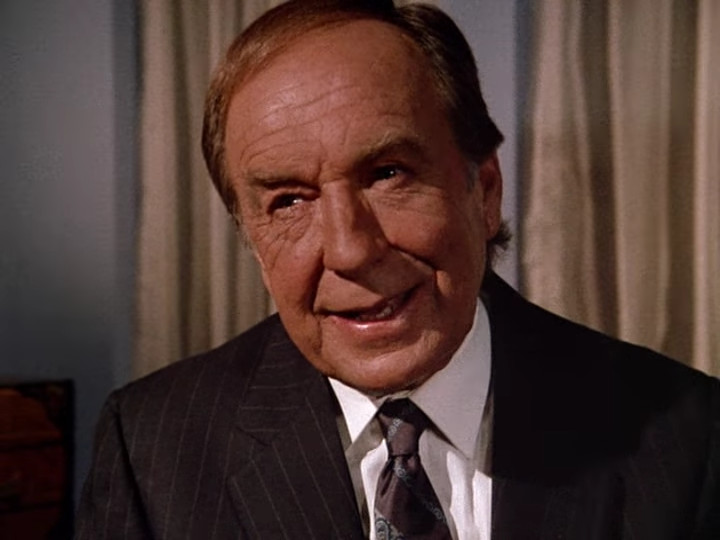
He foretells wealth and power for those bold enough to take quick and decisive action for it that most men would shrink from. I suppose having one witch instead of three can be attributed to budget cuts, and it being a man instead of a woman makes it an homage rather than mere copying. He’s telling this fortune to a woman and a man.

This is our Lady MacBeth for the episode (sort of). The episode’s MacBeth is played by a familiar face:
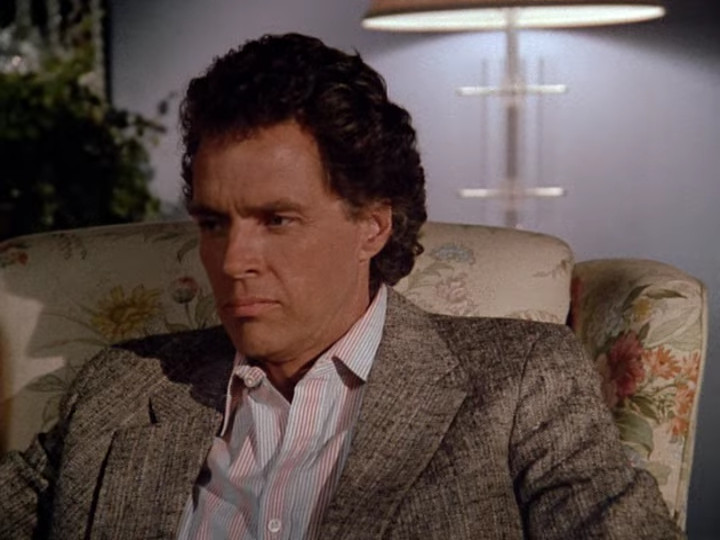
The actor is Richard Beymer. We last saw him as Sydney in The Days Dwindle Down. Here he’s Morgan MacCormack, an ambitious businessman.
The psychic goes on to say that Mr. McCormack must beware of a very determined woman whose will is even more powerful than his.
After the psychic leaves, the wife (whose name is Virginia, by the way) decides that the fortune means that Morgan will be appointed chairman (we’re not told of what, yet). As they debate this, the phone rings. It’s the chairman of the board of directors of Company Corp. He invites the couple to come to his house for the weekend. The chairman intends to make a big announcement. Virginia is certain this means that he’s going to resign and make Morgan the new chairman (because that’s how companies work in Hollywood—though, to be fair, in reality if a former chairman of a board of directors who is leaving under good circumstances and makes a strong recommendation, it is likely to be heeded by the board). The one thing she wonders is who is the determined woman with a strong will? Then we cut to this scene:

The episode strongly implies that the determined woman of strong will is Jessica, though I’m not certain that’s right, in the end. I’ll get to that in the episode analysis later. The woman to the left of Jessica is Lydia Barnett, wife of Duncan Barnett, the chairman of the board of directors of Barnett Industries. (You’ll recall that the king who MacBeth killed to take over the throne was named Duncan.) They are admiring Lydia’s garden when Duncan comes up:

When Jessica turns down the (joking) offer of being gardener on their estate because after all of the effort it took to tame her garden she doesn’t have the heard to begin again, Duncan remarks that Jessica is afraid of nothing, which is why he asked her to join their board of directors. This is slightly odd as it’s normally publicly traded corporations that have a board of directors and the board members of a publicly traded corporation are elected by the shareholders. (Granted, often at the recommendation of the top management of the company.)
Jessica has, apparently, been on the board for some time as she makes reference to the most recent board meeting. Also, apparently the company owns a paper mill near Jessica’s home town which Barnett wants to close and Jessica wants to keep open because its closure will put many of her neighbors out of work (the size and composition of Cabot Cove varies considerably with each episode).
We’re then introduced to two more suspects characters:
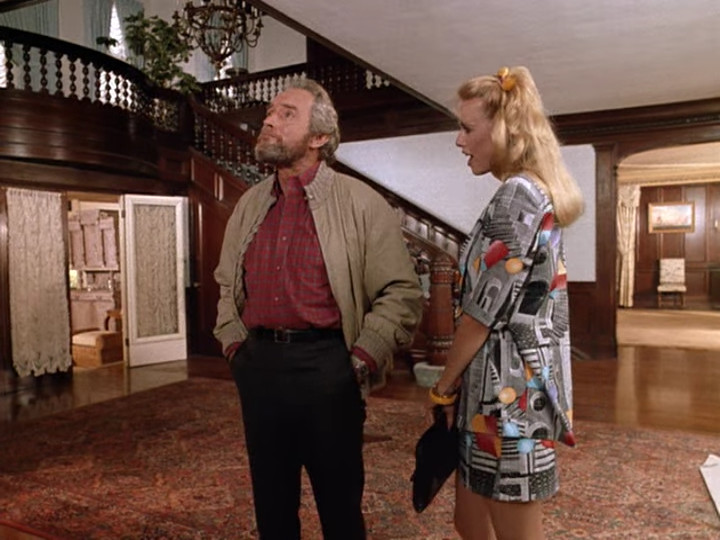
The guy on the left is Spruce Osborn, a competitor to Barnett, and the woman is Serena. These two are the first characters who don’t have any obvious analog in MacBeth. Lydia receives them ungraciously for some reason. She directs a manservant (“James”) to show Spruce to a suite that adjoins Duncan’s suite—it was her husband’s specific wish.
It comes up in conversation, once Spruce leaves, that he’s been trying to take over the company—he made Jessica “a very generous offer” for her shares. This really makes me wonder about the ownership of the company. If the majority of shares are owned by Duncan, then Spruce has zero chance of acquiring the company without Duncan selling to him. If Duncan owns a minority of the shares, it’s not his company. I don’t think that we’re ever going to find out because I don’t think that the writers ever thought it through.
The action moves to the tennis courts on Duncan’s estates. We meet another couple who have been summoned to this weekend:

The wife is Kate Dutton, and the husband is Tom Dutton. We also meet another “vice president” who is also a board member—the writers really don’t keep the corporate structure straight—Anne Hathaway:
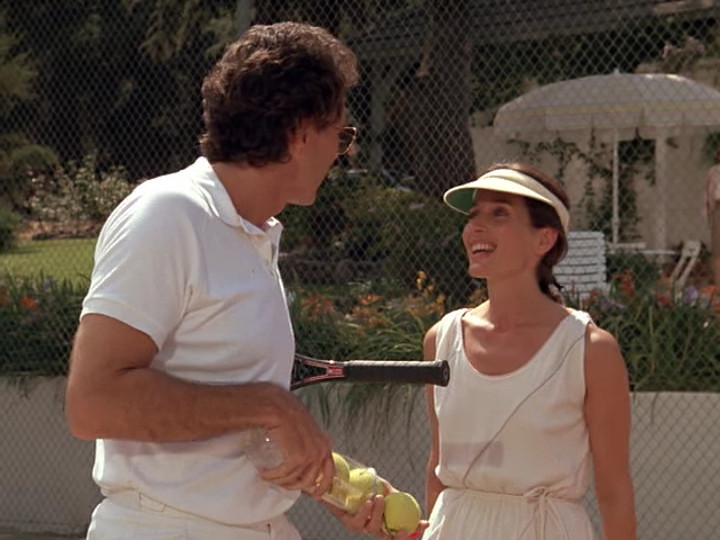
The name is curious, as it’s another Shakespeare reference, though not to The Tragedy of MacBeth. Anne Hathaway was the name of Shakespeare’s wife. We know approximately nothing about her beyond her name, so in this case it really is the case that any similarity to real people, living or dead, are purely coincidental.
The scene moves to Jessica and Kate Dutton, who are sitting at a table drinking iced tea. Kate remarks to Jessica that she has trouble keeping up with modern women, and Jessica replies that she doesn’t think that modern women are really all that different. I suppose Jessica should know, since she is one.
I know I keep beating on this drum, but Jessica is always written as a big city character. She holds to no traditions and the only thing she disapproves of is getting in the way of other people’s fun. For all that Jessica is supposed to be from Cabot Cove, the only way to tell is that she frequently says it. Though not in this episode, as I recall. If this episode was the only episode anyone saw, they’d quite possibly come away with the impression that Jessica lives in New York City.
That aside, it was a strange remark for Kate Dutton to have made. You can find all sorts of modern women—in the sense Kate means—back in the 1920s. In the late 1980s she really should have been used to them since they were common enough when she was still a babe in arms. Kate doesn’t really defend her remark, though, she just shifts slightly and says that she could never keep up with Anne Hathaway. There’s a bit more discussion where Kate admits that the wives of senior executes go through all sorts of scrutiny and put on performances to help their husbands ascent the corporate ladder.
Another facet of big business, as written by hollywood writers, is that they really want to be writing stories about kings and dukes and court intrigues, and seem to figure that a CEO and vice presidents are basically the same thing, or at least are close enough. I don’t know that this is harmless; I’ve met people whose stupid politics seem to have been based on this sort of nonsense in TV shows. Of course, they also usually thought that kings didn’t have responsibilities, either, so possibly the bigger problem was that all they knew of anything came from TV shows, and I doubt that well written TV shows would have helped all that much for a person in such dire intellectual straits.
That evening, there is a party in formal dress outside of the Barnett mansion:
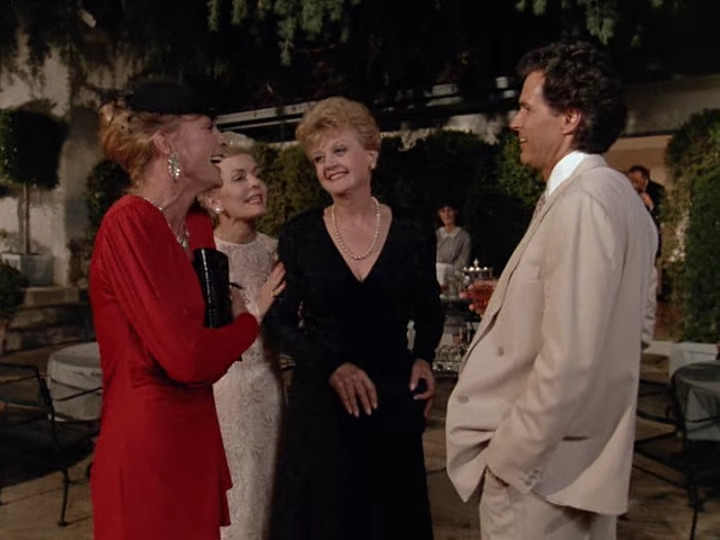
Duncan comes in talking with Anne Hathaway and his wife reminds him of his medication. He orders a selters with no salt and Spruce Osborn objects, telling the bartender to give Duncan a brandy. Duncan demurs, saying that his doctor only allows him one brandy—before bed—and that’s it. Then he finally makes his announcement. He plans to continue continue being the whatever-the-hell-he-is of Barnett Industries for a very long time. (The writers actually side-step what on earth he is by having him say “the rumors of my imminent resignation have been greatly exaggerated.”)
He then bids his guests a good evening, and retires for the night.
Virginia and Kate follow him and assure him that they’re delighted to hear that he’s going to remain king. He laughs in their faces, and continues on his way to bed.
The next scene shows Morgan and Virginia talking in their room about their disappointment. Morgan reassures his wife that time is on their side, and she suggests that they speed things up. Morgan is reluctant, but she resolves to do it.
We then see a spoon drop white powder into a brandy snifter while Virginia’s voice says that the only reason he can’t do it is that he doesn’t have the guts:

This is a bit of a departure from MacBeth, as in the play lady MacBeth only urges MacBeth to kill his king, she doesn’t actually do it herself. She only takes over after, in performing the coverup.
Though it is a small departure from MacBeth, it is a large departure from Murder, She Wrote. It does not, normally, show us who the murderer is before the investigation has started. This leaves us with only two options:
- It is not Virginia or Morgan who is poisoning the brandy.
- It is not the brandy that kills Duncan.
In a few seconds, we find out that it’s option #2.
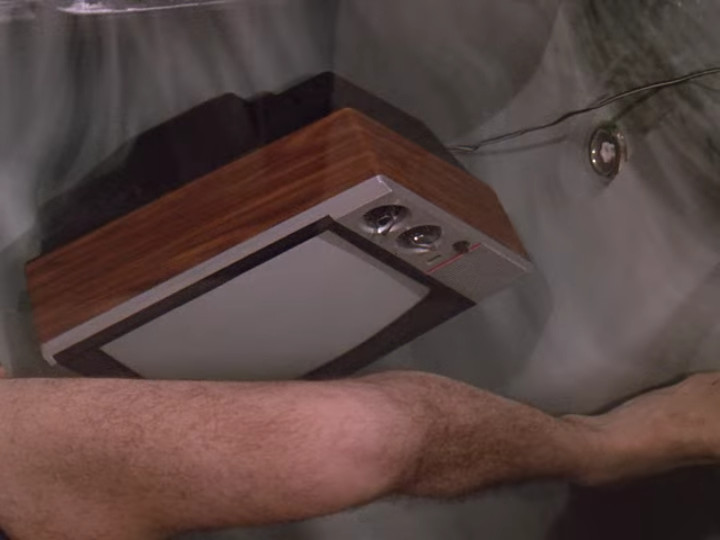
The camera pans over to show that the TV is plugged in, but that doesn’t matter much. Interestingly, when Jessica comes into Duncan’s bedroom to comfort his grieving widow, the glass of brandy is still sitting on the night table. Jessica notices it, too.

They didn’t make this subtle, so we find out that the brandy didn’t kill him within moments of seeing it be poisoned. (I do suspect that there was a commercial break inbetween, so the writers would have expected it to be several minutes, rather than seconds. Also, there’s a short scene of Jessica reading a book, the night before, and the lights dimming for a bit, causing her to look at her clock.)
I’m really not sure what to make of this, because what’s the point in pointing us in one direction only to conclusively change the direction moments later?
There’s an interesting clue presented in the next scene. It’s some time later and Jessica is comforting Lydia (Duncan’s wife) while Spruce Osborn gives her his condolences. He says, “I just wanted to extend my sympathies, Mrs. Barnett. Duncan and I were adversaries, but I wish it hadn’t had to be this way.” Jessica asks, “had to be this way?” and Osborn replies, “I didn’t mean that the way it sounds.” I think that this is meant to be a red herring, though it suffers a little bit from the typical Murder, She Wrote issue of anything that’s too obvious being certain to be a red herring. Plus, you wouldn’t expect the murderer to make so obvious of a slip before anything has had a chance to go wrong.
Spruce makes his goodbyes and leaves with Serena, then Dr. Chatsworth says that Duncan probably suffered very little.
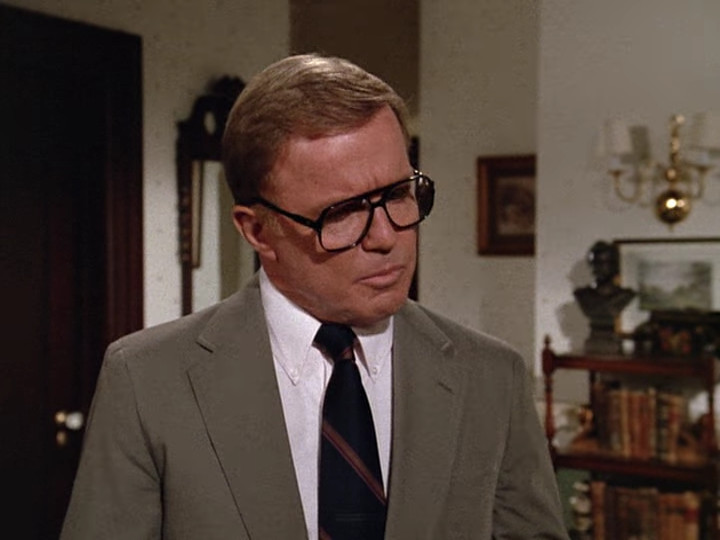
With his weak heart, the electrical shock killed him almost instantly. The doctor figures that he had a heart attack and in struggling to get out of the tub, he pulled the TV in with him. Now, this is the only shot they give us of the TV stand and the tub before things might have been moved:
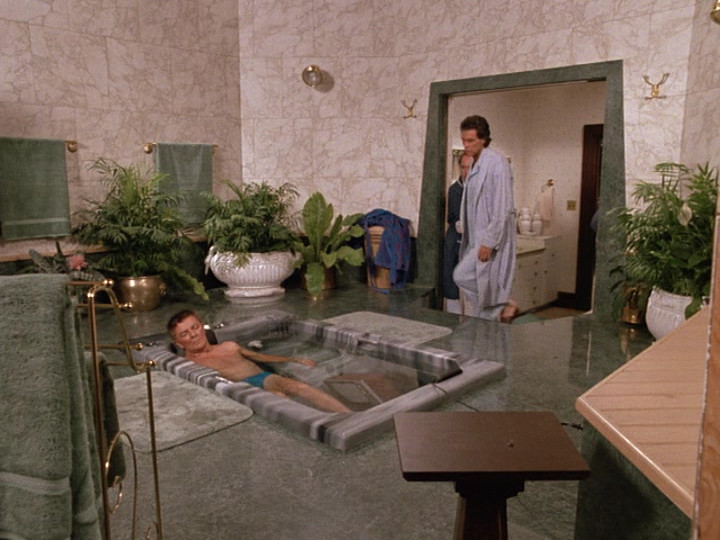
(the TV stand is the dark wooden stand in the foreground) and it’s not great because of the foreshortening, but in a later panning shot they establish that the stand is a good three or four feet away from the tub. The cord is at basically full extension and is at least 6′ long, with the outlet being right next to the stand. If he had knocked it off of the stand, it would have fallen on the floor. He’d have had to carry it backwards several steps to be able to drop it in the tub. Granted, this isn’t the sort of thing one has an entire course on in medical school, but it does make me question the good doctor’s judgment.
Jessica asks if it could have been the other way around, and the TV could have fallen in the water before the heart attack. The doctor says that he supposes that it was possible it happened that way. Lydia then starts unburdening herself to Jessica, saying that she used to warm him about watching TV in the tub, and even gave him a stand because he used to perch the TV on the edge (confirming that the TV really was quite far away from the tub).
As Lydia gets more emotional, Jessica offers her a drop of brandy. She gestures over at the brandy glass, but it’s missing!

“Strange, I thought I saw a glass of brandy there.”
It is helpful to point out that the glass of brandy is missing, but it is more than a bit strange to offer someone brandy from an already poured glass when you don’t know who the owner of the glass is. Even if she presumed it to be Duncan, “would you like to drink the brandy your freshly dead husband poured for himself but never got a chance to drink?” is not a question I would normally expect Jessica to ask.
I suspect that the problem is that this is not something that they can be subtle about, precisely because it’s a TV show, and a TV show from the late 1980s. That caused two problems which made subtlety difficult.
The first is specific to the 1980s: televisions didn’t show detail well, especially because so many people watched TV on broadcast television and so static was an issue in addition to the relatively low resolution of TVs at the time. As a result, if you wanted viewers to see things clearly, you had to be cropped in fairly closely on what you wanted them to see. As you can see above, to show us that the brandy glass is missing they have to zoom in. In these close-cropped shots, you can’t tell where you are within the room; if they merely showed an empty night-stand we might reasonably think we’re just being shown a different night-stand.
The second problem is more general to television: continuity problems abound in TV shows, so we might also reasonably conclude that a missing brandy glass which the script doesn’t mention was just a continuity error. If you compare the shot of the white powder being poured into the brandy glass with the shot of the missing brandy glass, you can see that they’re not in the same place relative to the lamp, they’re not next to the same lamp, and they’re not next to the same wall. (If you compare to wider shots of the room, they’re not even in the same room.)

Technically, the scene of the powder being poured into the brandy glass could have been meant to take place in an entirely different room, but that doesn’t make sense with either the plot or with the way the scene with the powder was shot. After the powder was poured, the spoon was used to stir the brandy very quietly, as if to avoid detection. Who would bother to quietly stir a glass of brandy in the privacy of their own room, before carrying it over to Duncan’s room? Who would switch brandy glasses and thus have to get the level very close to perfectly accurate, not to mention having to take the trouble of wearing gloves while carrying it or else wipe it afterwards? It was clearly meant to be lacing the glass that Duncan had already poured himself (and told the assembled crowd about at the party, earlier). Yet if you look at the subtleties, the details are all wrong, except for the glass itself. Heck, even the room wrong—in Duncan’s room the bottom 3′ of the wall are a dull green color with dark wood baseboard and a beige carpet, whereas in the scene with the powder we can see a white wall with white baseboard and a tiny amount of green carpet. (You can see the wall-to-wall carpet and baseboard in other shots of Duncan’s bedroom.) So we’re left with two possibilities: the person poisoning Duncan’s drink acted in an absurd manner, or there were continuity errors. My money is on the latter.
Regardless of which way you choose to interpret the different rooms, stands, and lamps, the fact that it’s an open question makes it difficult to rely on subtleties in TV shows. The writers have to work anything the audience is supposed to notice into the dialog, or at least into the plot—such as having a character pick something up and examine it. It could have been done more naturally than offering the widow her dead husband’s glass of brandy he didn’t get to drink, but I think it is more forgivable when one considers the necessities of TV shows, especially from this era.
Anyway, Morgon interrupts Jessica’s observation that there had been a brandy glass on the table by expressing his condolences, then asking to borrow Jessica for business. He informs her that he’s called an emergency meeting of the board of directors for that evening. Jessica is surprised that it’s tonight and asks if that isn’t a little hasty. I can’t imagine why she’d think it would be hasty—Duncan is very clearly dead. It would be one thing if he were lost at sea, or in the woods, or anyplace that he might still be alive and in consequence presuming him to be dead could be hasty. In this case, the doctor has given a death certificate. Also, the board of directors is less than a dozen people. It’s not like there are thousands of members of the board, many of whom will not be able to arrive for days. There’s nothing to wait for that could make this hasty.
Instead of pointing any of this out, Morgan merely says “perhaps” but that there are things that the board must decide before the market opens on the morrow, and that this tragedy is all that Spruce Osborn needs to stage a takeover. How this could help Spruce Osborn to stage a takeover is never mentioned, probably because there is no way for it to help that. Takeovers consist of buying shares from people who own them, not in riding up to castles with armies before the castle has had time to prepare and before they can be sure of who will support them during a siege. Duncan dying is not going to make a large number of people instantly willing to sell, especially if Duncan owned the majority of shares anyway. I think that this is probably just best understood as the need to elect a new king before the French seize on the moment of disarray to invade. There would actually be some truth to that necessity and possibility.
Morgan says that he understands that it’s short notice and that Jessica is very busy and he will understand if she can’t make it. She says that of course she’ll be there and he very clumsily tries to talk her out of it, saying that it will be very boring. Jessica points out that they’ll be choosing a new chairman of the board, and he guiltily admits that they will. If he was trying to lose her vote, he couldn’t have done a better job.
We then get an establishing shot of the king’s castle:
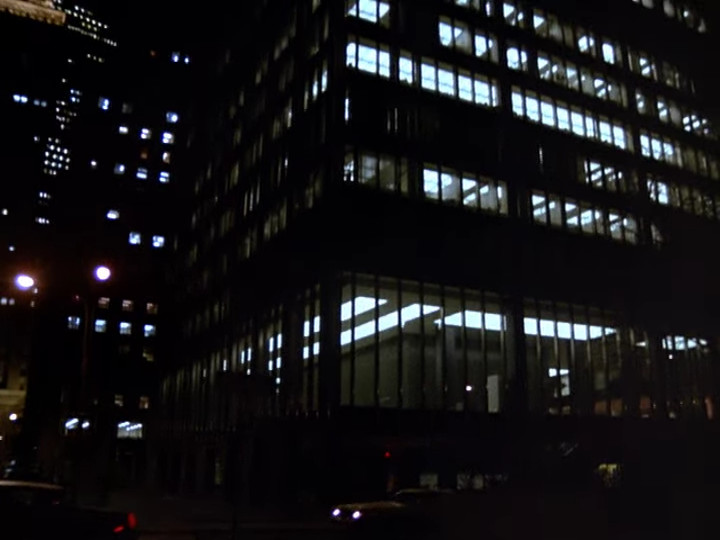
I mean, of the Barnett industries office building. Morgan and Tom Dutton are at each other’s throats, especially Tom Dutton. When Jessica arrives, Morgan welcomes her, and strangely Jessica says that she doesn’t expect to be able to help much, since she doesn’t know much about business. This is a complete change from her earlier stance of it being critical that she be there because they will be electing a new chairman of the board. I suppose that complete change makes Morgan’s complete change of reassuring her that her input will be valuable (“it’s people like you who keep us honest”) at least intelligible. Why any of this happened, I cannot tell.
Then the final board member shows up:
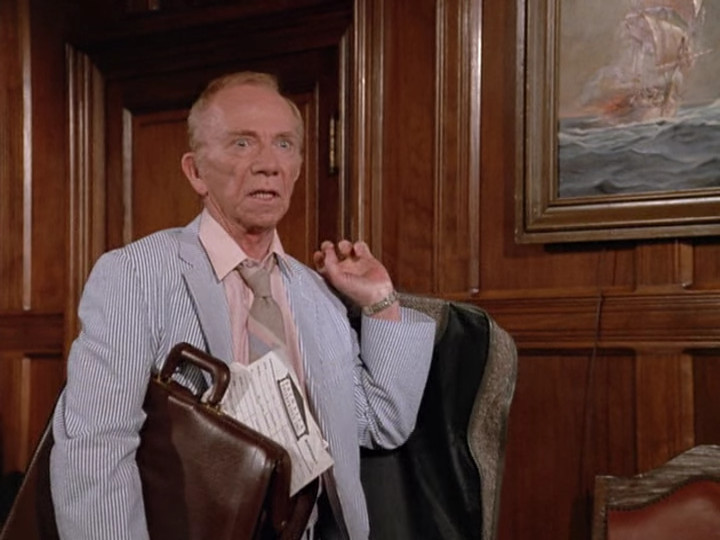
His name is Q.L. Frubson, the former assitant secretary of the treasury (of what, we’re not told; but he makes a point of saying that his boss was the one who was indicted, he resigned without a blemish on his record). He’s played by Ray Walston. Walston was in a ton of things (he has acting 155 credits on IMDB). I knew him best as the judge from Picket Fences, though he wouldn’t do that until 1992. Here, he plays a professional board member who is gruff and doesn’t want to be here. He arrives complaining about the travel to get here and how he as to take a 2am flight to get to his next board meeting the next day at the next company (whose name he can’t recall).
Jessica suggests that they begin with a moment of silence in Duncan’s memory, but Frubson objects saying that there is nothing in the rules of order about moments of silence, and besides Duncan would never have observed one himself. Given that he had to refresh his memory about what company he’s in, it’s curious that he seems to have known Barnett personally.
During an interlude where Jessica speaks confidentially with the secretary, it comes out that Duncan had been taking digitalis since his heart attack, and took two pills every day, one in the morning and one in the evening. Jessica calls the doctor and asks if it would be possible to find out if he had been given an overdose of the medication. The doctor says that it would, but the test needs to be done soon. He hangs up to order it.
It would be a bit odd if Duncan had been poisoned by brandy that we know he didn’t drink, so I’m not sure what’s on Jessica’s mind, here. It would not have been easy for anyone to have poisoned Duncan after dinner when he wouldn’t be likely to eat or drink anything before bed except that brandy.
I want to take a moment to look at the shot of the doctor when Jessica calls him:

Jessica opens her purse before calling, as if to pull out a paper and look up something. It strikes me as a bit odd that the doctor gave Jessica his home phone number, but perhaps she managed to wrangle that out of somebody else, and made a few calls and we’re only seeing the last, successful one. What I find more interesting is the setup. The whole thing just oozes eurdite authority. There’s the bookshelf filled with old books, many of them bound in leather. There’s the high backed chair, the table with tasteful nicknacks, and of course the jacket worn over his dress shirt which is only unbuttoned at the neck. Who, in 1987, gets home after a hard day of work, takes off only his tie, and puts on a jacket to relax? In 1887 Sherlock Holmes might do this because (1) no clothing was particularly comfortable at the time, knit cotton jersey not being common yet and (2) without central heating, indoor jackets were useful for comfort in the cool of British evenings. I really love how antique everything about this shot is except for the electric light and the telephone. It really fits Murder, She Wrote well.
The first order of business is to elect a new chairman of the board. Morgan and Tom each vote for themselves plus each gets one other vote. Anne Hathaway abstains, Frubson votes for Anne Hathaway, and Jessica doesn’t know what to do, so the vote is postponed. Tom and Morgan begin courting her for her vote, with Tom going first, over takeout dinner in the chairman’s office. We get the backstory that Tom has been with the company since he was seventeen, and has been everything from mail boy to factory foreman. Duncan as good as promised him that he would take over at some point.
After they’re done, they walk into Morgan telling Frubson that he knows why Frubson gave his support to Anne and he won’t let Frubson get away with it. Morgan then apologizes to Anne saying that she’s qualified but he’s only being realistic about the market’s perception of a chairwoman. Anne tells him that she understands. It makes no sense that Morgan waited this long to say this to Frubson, given that he wasn’t waiting for privacy to say it. The viewer needed to see it, though, so it’s one of those cases where we just pretend that no one is doing anything while the camera is away. Frubson excuses himself to go call the airline to change his flight.
Jessica forgot her sandwich in Duncan’s office, so she goes back to get it. She walks in on Frubson talking to Spruce Osborn on the phone. He doesn’t notice her as she walks in, but when he finally notices her he pretends he’s talking to the airport. This scene fades to an establishing shot of the next day, on what I’m pretty sure is a different building than the one we saw at night:
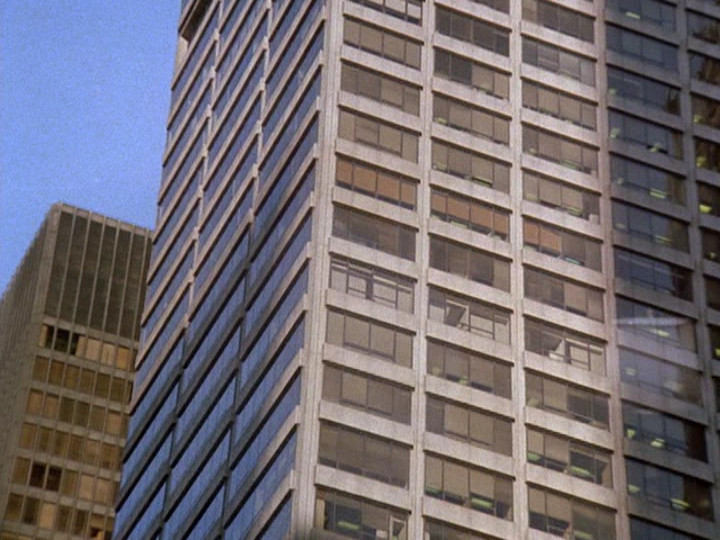
It’s hard to be absolutely sure that this is a different building, since the shot at night was not exactly a 4k HDR shot, but at a minimum the angle is very different. That said, I’m 99% sure it has a different number of windows per vertical column. This gets to what I was talking about before—that a problem television has is that you can’t trust visual details because they may simply be a lack of continuity. Frankly, it’s actually doubtful that the outside establishing shots were shot for this episode; if they weren’t straight-up stock footage, they may well have been shots gathered on an expedition (seasons before) to get some b-roll to be used for establishing shots on other episodes. At the time of shooting, they may never have been intended to represent the same thing at all.
(A curious example of this reuse of footage for a different purpose is in the movie Terminator 2, the closing shot of a car driving in the dark over which Sarah Connor gives her closing narration in voiceover was actually shot on approach to the hospital, earlier in the film. It lacked any detail to give away that it wasn’t Sarah and John driving away from where the T-1000 hunted them, though, so it was used in a way to suggest that. TV, with lower budgets than movies, tended to be even more economical about these sorts of things.)
In short, when writing a TV show you can’t expect the viewer to look closely at shots to find clues because the entire nature of television shows is that you don’t want the viewer looking too closely.
Inside the building, the board is still in the board room arguing over who should be the chairman of the board. Jessica gives one of her moral scoldings that might have had some weight if she ever disliked anything besides unpleasantness. (See the conclusion to Murder She Wrote: When Thieves Fall Out.) The upshot is that Tom moves to make Morgan temporary chairman for ninety days. Anne Hathaway, who is the only one really selling the idea that they’ve been up all night, moves that they make the motion unanimous, and everyone agrees, though Frubson is very reluctant to do so.
This is one of those issues with TV, btw, that all of the people who are, theoretically, completely exhausted are all being played by actors who got plenty of sleep the night before the scene was filmed. It’s not very important to the plot, here, but it sometimes is (as in the case of drunks played by sober people). It’s related to how Movies Are Intrinsically Misleading. It actually gets worse later that day, though, when the people who should be even more tired are now all completely wide awake.
Jessica comes into Morgan’s office and talks to him about his accusation to Mr. Frubson the night before. She did some digging and it turns out that Frubson served on four boards of companies that had been taken over by Spruce Osborn. Morgan assures her that he’s going to get Frubson off of the board as soon as possible. How, I’ve got no idea, since that’s not really how boards of directors work, but who cares? This episode isn’t really about corporations.
In the next scene Jessica walks into a room where Anne Hathaway and Tom Dutton are talking in a conspiratorial manner. Anne says that she agrees with Tom, but can be of most use to him if she keeps her nose clean. He insists that she can “get those proxies signed”. Why he thinks this, I’ve no idea. Proxy solicitation is the sort of thing that proxy solicitation companies do. It’s labor-intensive work to try to convince shareholders to have someone be their proxy in shareholder voting. A vice president/member of the board of directors isn’t going to have any special ability to “get proxies signed,” unless she happens to be personal friends with a major shareholder. Who, incidentally, is likely to be Duncan’s widow. At least if the suggestions that Duncan held a controlling fraction of the shares of his company are true, it would basically be up to Lydia to determine who is on the board of directors, so you’d expect the members of the board to be sucking up to her.
Jessica asks for directions to Spruce Osborn, and for some reason Anne knows his home address. Jessica goes and visits him. He tells her that if she’s come to sell her shares, he’s no longer buying, and has withdrawn his bid. Jessica asks him about Frubson, and he admits that Frubson is his man, and because Frubson was unable to complete his mission, he has withdrawn his bid. He sold his Barnett Industries stock this morning, before the news of Barnett’s death got out. He does plan to buy it back if the stock goes low enough. I don’t really follow the logic, here; nothing Frubson could have done would have resulted in Osborn wanting to not sell his stock prior to its value dropping because of the news of Duncan’s death. In fact, as far as I can tell, Frubson’s mission was to prevent a new chairman from being elected, which would, presumably, make the stock plummet even more. That would give him even more incentive to get out of the stock, not less. I really hope that the writers of this episode kept their money in bonds, or gold, or pork bellies, or something that they understood at least a little bit.
Jessica accuses Osborn of killing Duncan (not in those words) and Osborn said that if he had wanted to win, he would have. His advice to Jessica is to look at who did win.
The next scene is of Morgan talking to Virginia about how Jessica knows what they did. He realizes that she must have seen the brandy glass before he took it away. Again, this is strange because it’s just rehashing how they didn’t kill Duncan. Given how pressed for time Murder, She Wrote is, it seems like a waste of time. There is a callback to the fortune teller from the opening, when Morgan identifies Jessica as the woman with a will more powerful than his. Perhaps it was to keep that opening alive? But why? We’ve (pretty) clearly established that Morgan and Virginia didn’t kill Duncan. Maybe this is an attempt at a red herring?
Jessica talks with the doctor on the way into the Barnett house for the funeral. The digitalis test is taking a long time, so instead Jessica proposes counting the pills. The doctor only needs to call his office to find out how many Duncan should have had left. He goes off to do that and Jessica talks with Lydia. When Jessica tells her that she thinks it was murder, Lydia tells Jessica that she knew that Duncan was having an affair with some woman. The doctor comes back and tells Jessica that four pills are missing, and that would have been sufficient to induce a heart attack. Lydia exclaims, “then it was murder!”
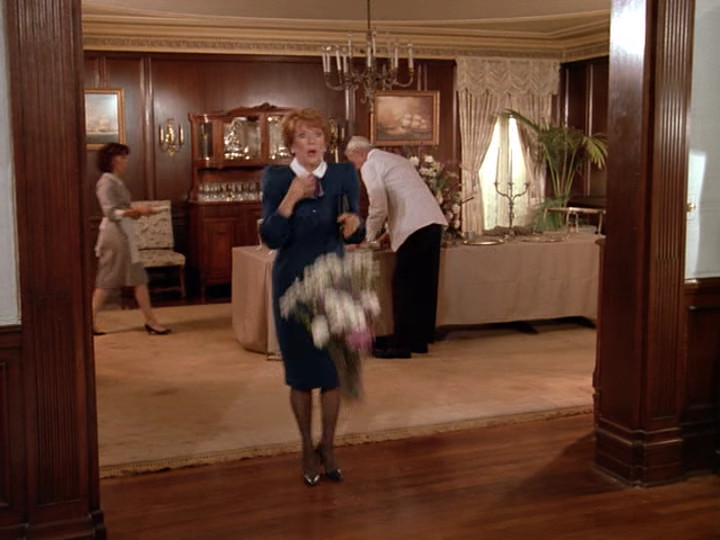
Kate Dutton, who was just walking into the room, drops the vase of flowers she was carrying when she hears the word, “murder.” Jessica and the doctor go up to look at the hot tub, and Kate follows them. She tells Jessica that the night Duncan died she passed by his room and heard voices coming from the hot tub. Duncan was in there with Serena—the girl who came with Spruce Osborn.
Jessica and the doctor examine the hot tub area and Jessica finds a gold charm.
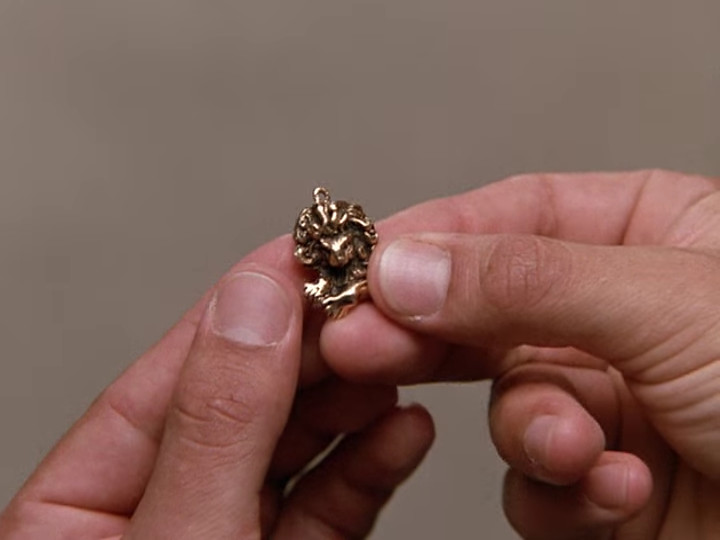
The next scene is at the close of the funeral. Some guy (who later turns out to be police Lieutenant Grayson) comes up and gives the results of the digitalis test—there was no overdose of digitalis in Duncan’s system. They ran the test twice just to be absolutely sure.
At the reception at the house, Jessica sees Serena go up to Duncan’s hot tub to look for her missing charm. Jessica follows Serena and confronts her with it. Serena admits to being in the hot tub but claims that she and Duncan never did anything, and Jessica concludes that Duncan had Serena insinuate herself with Spruce to gather information on him, which she admits.
Jessica then goes off to find Morgan to accuse him of attempting to murder Duncan. Morgan denies it but Jessica blackmails him and Virginia admits it. She talks with Jessica privately (and promises to deny everything she will say). She begins by telling Jessica about their psychic’s prediction to be ware of a woman with a powerful will. Jessica asks her about what happened because she’s more interested in figuring out who did kill Duncan than in proving that Morgan and Virginia only tried to. It turns out that Morgan was going to do it but was scared off by the sound of a woman’s voice coming from the bathroom. Jessica remarks, “Oh, yes, Serena.” Virginia doesn’t know, however, because it was impossible to identify the voice with the water gushing and the door closed.
The remark, “the door closed,” gives Jessica the critical insight. Cue clue face:

Jessica then sets the trap to catch the murderer:
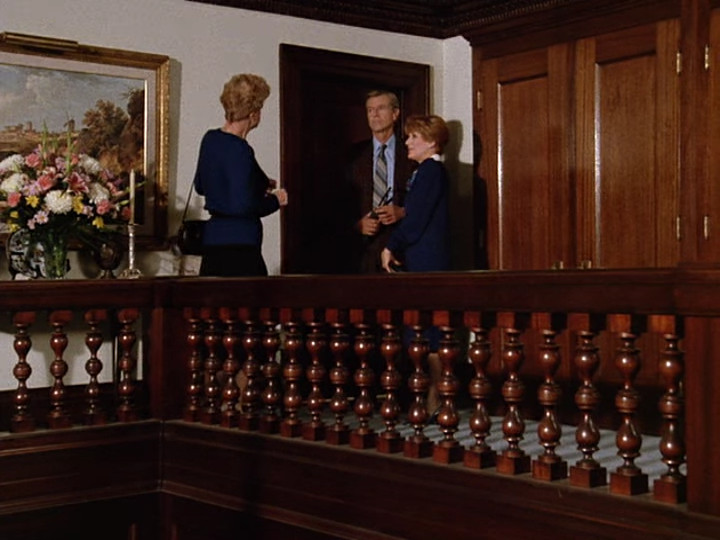
The guy is Lieutenant Grayson. (I had to look him up on IMDB.) They mention him elsewhere in the episode, but he got exceedingly little screen time. They go to where Kate said she heard Serena, and Jessica asks if she’s sure that it was Serena. Kate is absolutely positive. Lt. Grayson then uses his radio to tell people in the hot tub to start talking, and we hear muffled voices. Kate says that the door was slightly open that night, and they slightly open the door, though the voices are still too muffled to identify.
Kate then says that she actually saw Serena. Unfortunately for her, Serena left by the connecting door, as Duncan had placed Spruce (and thus Serena) in the room right next to his. The only way she could have known that Serena was there was if she were hiding in Duncan’s room, waiting for Serena to leave.
Kate, confused and scared, said that she doesn’t know what Jessica is talking about, this is obviously Serena’s voice. The Lieutenant leads the way, and it turns out to be the doctor and Anne Hathaway.

Kate tries to blame Anne, though that makes no sense whatever and Lt. Grayson says that Anne has an airtight alibi.
Kate then breaks down, saying that she didn’t mean to kill Duncan. She only wanted to talk to him. It was so unfair the way she had been treating Tom. She begged him to give Tom a chance and his only response was to ask her to adjust the horizontal hold on the way out. (For those not familiar, analog TVs had timing signals that controlled what information was on which line; they could be manually adjusted with dials because the timing signals were not always picked up on properly by the television, especially if there was interference.) As she adjusted it for him, she got angry and threw the television in.

Curiously, in the flashback she walks several steps over to put the TV in the far side of the tub. This is actually consistent with where it was found, which is almost surprising. I wonder why they put it so far from where the stand was, though? The character had no real reason to do it, and I can’t even think of why the TV crew would want the prop there instead of closer.
Interestingly, Kate says that she’s not sorry that she did it. You only get one of those exclamations in about one out of ten Murder, She Wrotes, if that. “He was a horrible man and he just used people. He’d find good men, and just use them up.”
The final scene is at the Barnett industries corporate building. I think that the building in the establishing shot is a a different building yet again, making that three different buildings in three establishing shots of the same building:

As I said, you really can’t trust details in a TV show.
Curiously, we actually get a fair amount of closure on the non-murder plot in this episode. Anne Hathaway is voted chairman of the board, nominated by Tom Dutton. Jessica commends him because it had to be hard, and Tom replies that there was no other choice, with Morgan’s resignation. He would just be a liability, and he doesn’t think that he’s going to be around much longer. Anne tells Jessica that the paper mill is going to stay open. Jessica says that it’s very public-spirited of Anne, but Anne replies that it’s just a business decision. They’ve bought three magazines and her figures show that if they can make their own paper, they will save a lot of money.
Jessica says that the company seems to be in good hands, and Anne gives Jessica her word that it is. “I’m a very determined woman.” Jessica smiles—possibly connecting this with the psychic’s prediction she was told about—and we go to credits.

All things considered, this is a very strange episode. It derives a certain amount of inspiration from The Tragedy of MacBeth, but not really enough to be called an homage. It doesn’t take any of the real insight into human nature from MacBeth, which is what an homage should do. It doesn’t even much steal any of the plot from MacBeth, either. All in all, it’s about as related to MacBeth as Murder She Wrote: Night Of The Headless Horseman was to The Legend of Sleepy Hollow. I suppose it was a bit much to expect more, but there was a certain amount of promise in the beginning.
One thing that I will give this episode is that it was beautiful. The major locations were luxurious and opulent. Duncan’s home was delightful to look at, the board room had beautiful wood paneling and excellent furniture.
The plot, itself, is fairly basic; a rich man was killed in order to take what was his. The setup was a bit complicated but the mystery itself was relatively simple. Since we can rule out Morgan and Virginia, the only other suspects were Lydia (Duncan’s wife), Spruce Osborn, Serena, and the Duttons. We can rule out Spruce because he’s not the sort of man to do his own dirty work just to complete one more business deal that wasn’t that important to him. We can rule out Serena because her only motive would be… I don’t know. I can’t even think of a motive. Maybe doing Spruce’s dirty work, except that wouldn’t even make sense. So we can cross her off too. As far as I can tell, she was only in this episode in order to have someone in the hot tub with Duncan shortly before he was killed.
Other than the Duttons, that only leaves Lydia. She’s unlikely since she starts off seeming like an old friend of Jessica’s, but that’s not impossible. Old friends of Jessica do occasionally murder people in Murder, She Wrote. She’d have been a good choice in terms of being the least likely suspect, since the entire episode pointed to a business reason for the murder. If Lydia killed Duncan because she was enraged at his infidelity, that would be a reasonable motive and a great way to foil expectations. The real problem was that she just wasn’t enough of a character in the story. She’s a loyal wife in the beginning and seems to have affection for her husband. After that, she’s a grieving widow in about two scenes. Granted, Kate Dutton didn’t have that much more screen time, still, we did at least get some of her motivations. We really have no idea what motivated Lydia.
Actually, it’s a bit worse than that. We really have no idea what Lydia’s relationship to anyone was. She and Jessica speak to each other in affectionate ways about gardening, but there’s no indication that the two actually knew each other before that day. She barely talks to her husband, but does show some concern for him, at least enough to remind him to take his medication. She also cared enough to be jealous of Anne Hathaway. On the other hand, she slept in a separate bedroom and was sure that Duncan was having an affair with someone.
Those last two are a bit strange, actually. I’m pretty sure that she slept in a separate bedroom because it would have been near-impossible to have Duncan murdered in his hot tub if Lydia slept in the same bedroom as her husband. The justification for it we were offered was that Duncan’s idea of relaxing was to listen to stock quotes before going to sleep, which is fair enough. Wanting to go to sleep at different times is a legitimate reason to sleep in different rooms, though Duncan could easily have watched TV in a recliner somewhere before he walked off to bed, which makes one wonder if this was less about simple practicality and more about the state of their marriage.
The part where Lydia was sure that Duncan was having an affair with someone, though, really needed more explanation. Why was she sure of this? Why did she even suspect it? This was the last substantive thing that Lydia ever said in the episode, though. She was interrupted by the doctor coming in, and her only other line in the scene—which is the last scene she’s in—is her telling Kate not to worry about the dropped flowers. I suppose Lydia not getting any closure on her character doesn’t matter all that much with her character never having been developed.
I do want to consider the character of Serena a little bit more, as it doesn’t really make sense either. She was only substantively in one scene, where it’s revealed that her airhead demeanor earlier on was merely for show. She was actually a spy for Barnett, who had planted her as Spruce Osborn’s girlfriend in order to gain information. Completely unexplained was how she and Barnett knew each other. Since she invokes copulating with Spruce on the night of Duncan’s death as an alibi, this would make her a prostitute as well as a spy if she’s being paid for it, and if not, what terms could she possibly be on with Barnett to do this for free? If she was being paid for it, though, why would she undress to get into the hot tub with Barnett in order to convey the information she was being paid for? In 1987 she wouldn’t have had a cell phone to call him to relay this information but landline telephones were easy to come by. She would hardly have moved in with Spruce having only started dating him a few weeks before, so she’d have her own telephone, too. Even if she didn’t want calls to Barnett to show up on her telephone bill for fear of Spruce finding out (somehow), in the late 1980s pay phones were plentiful. There was absolutely no reason to meet Barnett clandestinely at night in order to relay the secrets she acquired, to say nothing of getting undressed to do it. On the other hand, she was very clear that she and Duncan never did anything physical, and had no reason to lie about this. No matter how you slice it, I can’t make out a motivation for her to go to the lengths she did to spy on Spruce Osborn or why she was in the hot tub with Duncan in order to tell him about it.
To some degree I suspect that she was in the hot tub with Duncan only in order to give Kate a way to give herself away. Which brings me to how Kate gave herself away.
It was very curious to have Kate drop the vase when the word “murder” was spoken. Murder, She Wrote doesn’t usually foreshadow the murderer in that way. This is the first way she gave herself away, and I don’t really know what to make of it. On its own, it doesn’t prove anything, but it does make one feel more like she was built up to as a murderer. I’m undecided on whether it’s a fair way of doing it, though. Ambiguous evidence should really be more about things said or done that are related to the murder, not merely to feeling guilty. I suppose that this could be meant as being related to MacBeth, where Kate, and not Virginia, is the Lady MacBeth being eaten by guilt. It’s a bit of a one-off, if it is, though.
The more substantive way that Kate gives herself away is by telling Jessica about hearing Serena in the hot tub with Duncan. There is some reason for it, though not a great reason. In theory she could want to try to frame Serena for Duncan’s murder. I don’t know that this would have seemed all that plausible, though. Serena had no motive and Kate’s testimony is the only evidence that Serena was there (so far as she knew). Even stranger is that she had no motive to actually succeed in framing Serena; all she could have cared about was diverting suspicion away from herself. This is important because, had she been more careful and merely said she thought it was Serena but couldn’t be sure, she wouldn’t have been caught. She could have said that it sounded like a young woman and Serena was the only young woman in the house. She could have said she heard a woman, but couldn’t tell what woman. Jessica even gave her an opportunity to say that she didn’t hear clearly, but Kate expressed certainty that it was Serena. Her conviction that it was Serena did her no good, and proved her undoing.
It’s also a bit curious that she broke down and admitted to the murder with extremely little evidence against her. She said that she was certain that the re-creation voice was Serena, but it turned out to be Anne Hathaway. Had she expressed surprise and then said that she isn’t certain at all, now, because clearly she’s not as good at identifying muffled voices as she thought, she would still have gotten away with it.
It’s always unfortunate when the thing which catches the killer is something that they did afterward, and not a piece of evidence about the murder, itself. This is no exception. Heck, until Kate confessed, not only could Jessica not prove that it was her, Jessica couldn’t even have proved that Duncan was murdered.
Duncan is also a curious character in this story, by the way. He is initially played as affable, but is quickly revealed to be cruel and eventually to be immoral. He invited a bunch of people up to his house at short notice just to get their hopes up in order to enjoy dashing them. He hired or otherwise influenced Serena to prostitute herself to Spruce Osborne in order to spy on him for corporate secrets. In the end, Kate’s description that he was a cruel man who took good men and used them up seems entirely plausible. Which takes this even further away from MacBeth.
Then there’s the subject of how much the writers of this episode misunderstood how corporations work. Heck, they couldn’t even keep CEOs and Vice Presidents straight with chairmen and members of the board of directors. Boards of directors are not the same thing as senior management. Also, public companies can only be purchased in a hostile takeover if a majority of their shares are available for purchase. If Duncan owned a majority of the stock in his company, Spruce Osborne couldn’t have dreamed of taking it over. If he didn’t, he couldn’t have told Spruce Osborne that the company wasn’t for sale.
Oh, and the chairman of the board of directors is not a position for life. Duncan couldn’t announce that he’ll never leave. Well, unless he was the majority shareholder, in which case the board of directors were people that he simply voted onto the board himself, and thus would be yes-men, not corporate climbers. They’d be people like Jessica and Q.L. Frubson—outsiders who did very little, selected mostly for prestige.
It is possible to take the line that this is a murder mystery, not a corporate documentary, so verisimilitude doesn’t matter. There is a sense in which this is correct, but it only goes so far. First, it is possible to get things far more correct than they did here while maintaining the plot. Many of the mistakes were just straight-up laziness. Worse, getting this stuff wrong makes it harder to follow the plot. If a man was killed by a computer programmer and it turns out that the janitor did it because his janitorial work isn’t mopping floors but is actually programming computers, this would be cheating. Bleating, “but it’s just a work of fiction, who cares if janitors don’t really program all the time!” would not excuse it, any more than it is excusable to make perfectly harmless substances poisonous or to have somebody travel two hundred miles an hour on a highway in order to get around their alibi. Since no one’s relationship to anyone else makes any sense in this episode, it’s more difficult to figure out who is and is not a suspect. Would Spruce Osborne murder Duncan in order to seize his company? Who knows? In real life that wouldn’t be possible, but maybe it’s easy in this episode. Would Anne Hathaway try to get Duncan to divorce his wife who gave him no children so she could give him a male heir so his company won’t fall into civil war after he dies? Maybe, given how little the writers understand business. Could she have killed him so that their illegitimate son could inherit the company? Why not? Given that reality is not a tether, here, the sky is the limit!
(There’s also the issue that some poor, unfortunate souls learn about business from TV like this, and so become astonishingly badly informed. I don’t think it’s fair to put too much about general education on the shoulders of television, but it is another reason to not make pointless mistakes.)
Ultimately, this was an ambitious episode that didn’t work. It was beautiful, and to that degree it was a lot of fun, but it was confusing and a bit infuriating in its sloppiness, and Jessica only caught the murderer because the murderer was stupid after the fact. The references to MacBeth were mostly dropped once the episode got going and neither served to make the episode better nor to give any insight into the play. Not that it really could have; a play in which the murderers mentally fall apart is approximately the opposite of a murder mystery.
I called it the greatest of the business episodes, and yet in many ways it’s one of the worst of the Murder, She Wrote episodes. To some degree, those are the same thing. Murder, She Wrote did worst when episodes had any form of business in them.
Discover more from Chris Lansdown
Subscribe to get the latest posts sent to your email.
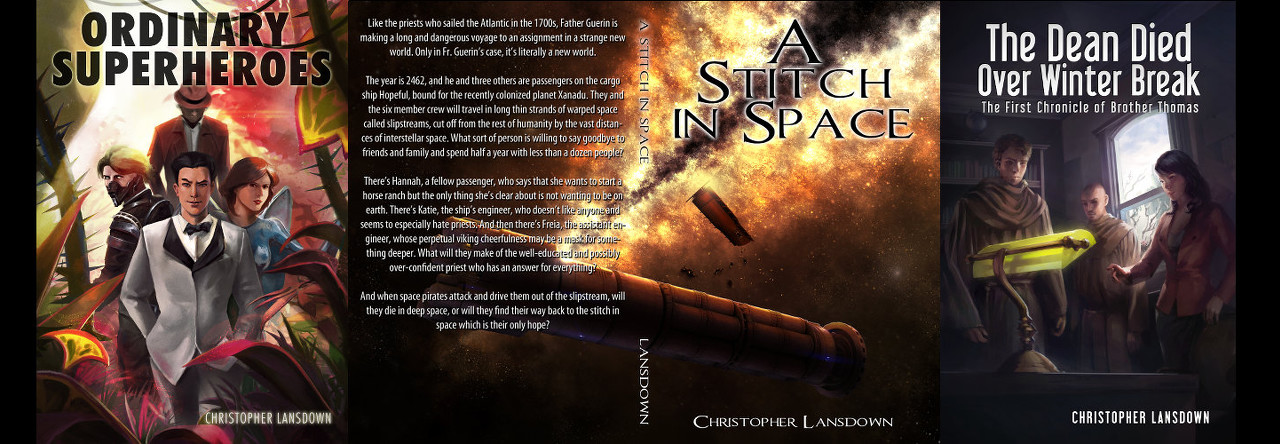
These are always fun to read. I enjoy how in-depth you go in reviewing them.
LikeLiked by 1 person
Thank you!
LikeLike
Pingback: Murder She Wrote: Steal Me a Story – Chris Lansdown